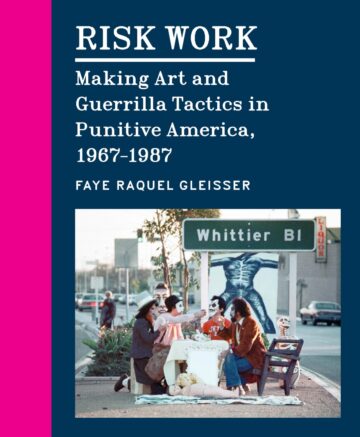How artists in the United States starting in the 1960s came to use guerrilla tactics in performance and conceptual art, maneuvering policing, racism and surveillance.

As U.S. news covered anti-colonialist resistance abroad and urban rebellions at home, and as politicians mobilized the perceived threat of “guerrilla warfare” to justify increased police presence nationwide, artists across the country began adopting guerrilla tactics in performance and conceptual art. “Risk Work” tells the story of how artists’ experimentation with physical and psychological interference from the late 1960s through the late 1980s reveals the complex and enduring relationship between contemporary art, state power and policing.
Focusing on instances of arrest or potential arrest in art by Chris Burden, Adrian Piper, Jean Toche, Tehching Hsieh, Pope.L, the Guerrilla Girls, Asco, and PESTS, Faye Raquel Gleisser analyzes the gendered, sexualized and racial politics of risk-taking that are overlooked in prevailing, white-centered narratives of American art. Drawing on art history and sociology as well as performance, prison and Black studies, Gleisser argues that artists’ anticipation of state-sanctioned violence invokes the concept of “punitive literacy,” a collectively formed understanding of how to protect oneself and others in a carceral society.
About the author
Faye Raquel Gleisser is associate professor of contemporary art and critical theory and an affiliate of the Center for Research on Race and Ethnicity in Society at Indiana University, Bloomington. Her scholarship has appeared in Art Journal, Artforum, ASAP/J and the Journal of Visual Culture, as well as in catalogues accompanying exhibitions such as “The Propeller Group,” “Out of Easy Reach” and “Prospect.5: Yesterday We Said Tomorrow,” among others.
